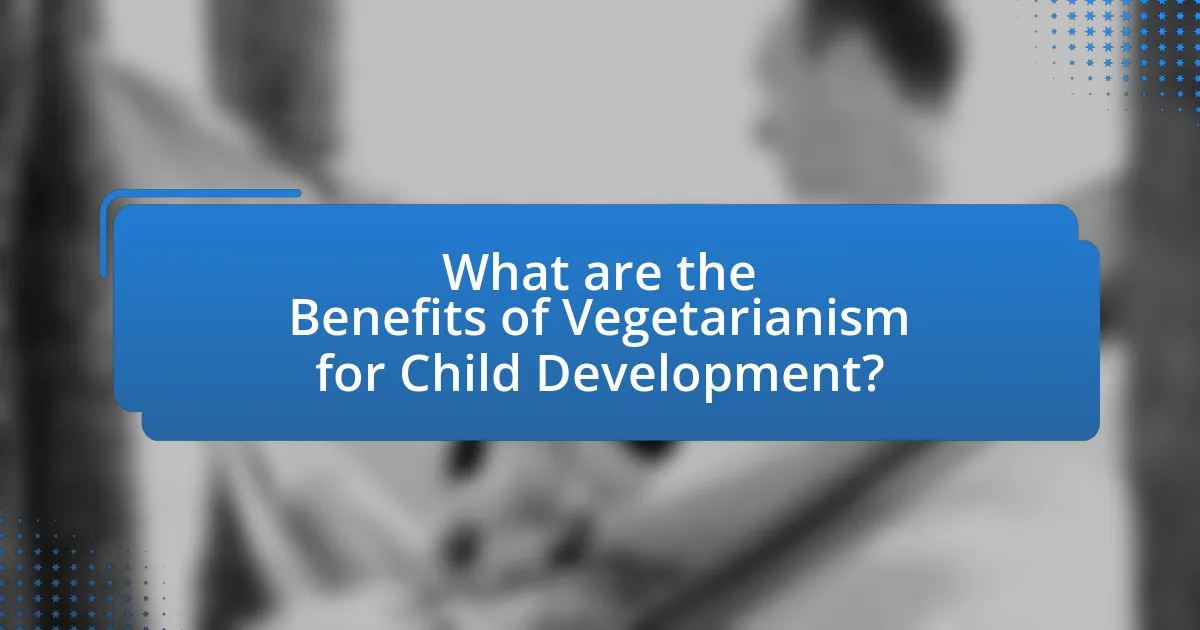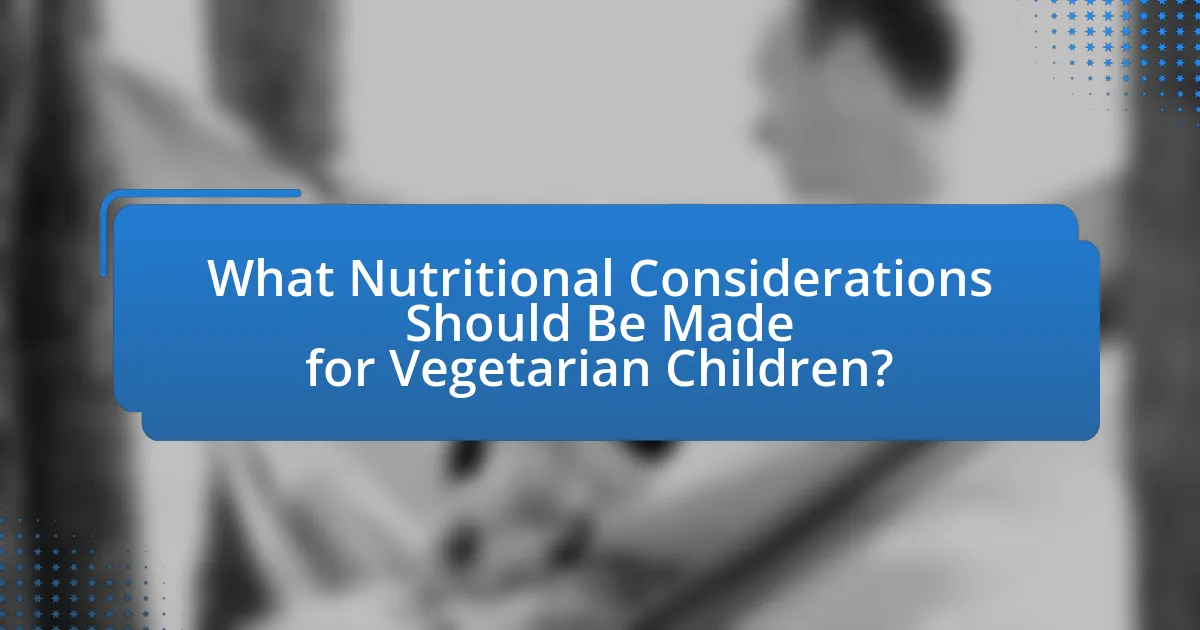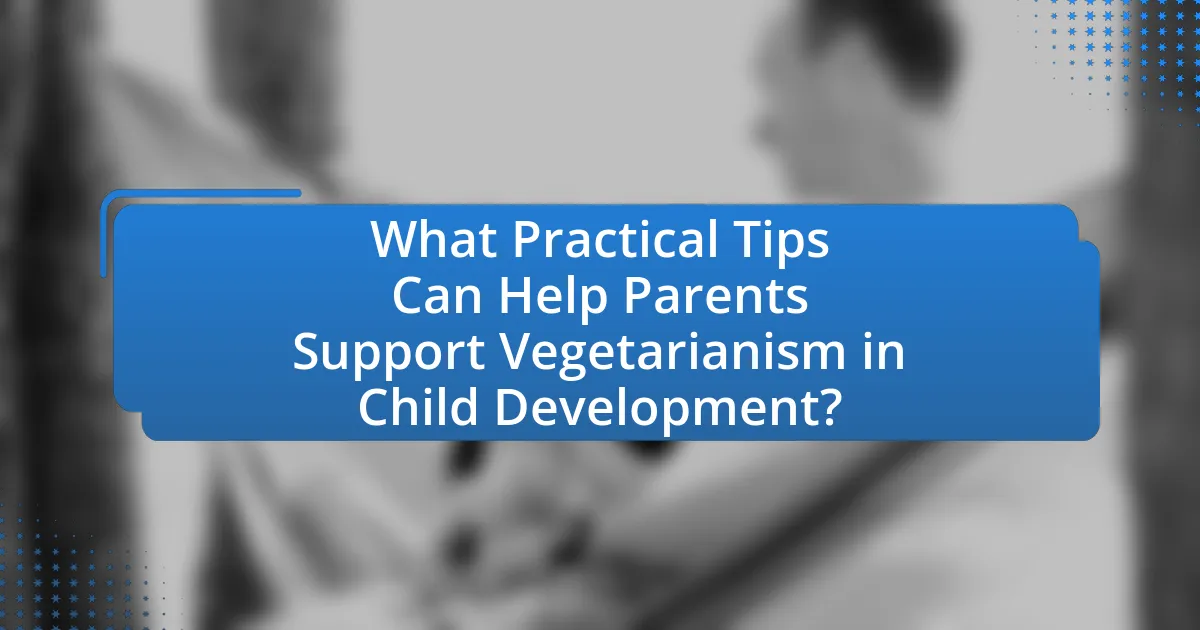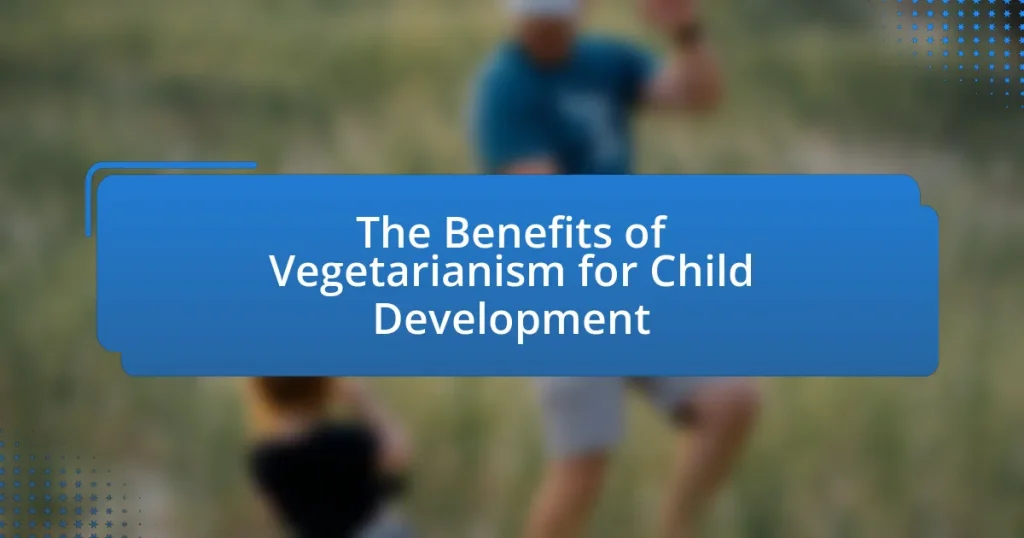The article examines the benefits of vegetarianism for child development, highlighting its positive impact on nutritional intake, cognitive function, and emotional health. It discusses how a well-planned vegetarian diet can support physical growth by providing essential nutrients such as protein, iron, calcium, and vitamins B12 and D. Additionally, the article explores the cognitive advantages associated with plant-based diets, including enhanced memory and learning capabilities, as well as the emotional benefits that foster empathy and social awareness in children. Practical tips for parents on meal planning and ensuring adequate nutrition for vegetarian children are also provided, along with resources for further information on vegetarianism.

What are the Benefits of Vegetarianism for Child Development?
Vegetarianism offers several benefits for child development, including improved nutritional intake, enhanced cognitive function, and better emotional health. A vegetarian diet is typically rich in fruits, vegetables, whole grains, and legumes, which provide essential vitamins, minerals, and antioxidants necessary for growth and development. Research indicates that children following a vegetarian diet often have lower risks of obesity and related health issues, as they consume fewer saturated fats and more fiber. Additionally, studies have shown that diets high in plant-based foods can positively influence cognitive abilities, as nutrients like omega-3 fatty acids from sources such as flaxseeds and walnuts support brain health. Furthermore, vegetarianism can foster a sense of empathy and social responsibility in children, contributing to their emotional well-being and moral development.
How does a vegetarian diet impact physical growth in children?
A vegetarian diet can positively impact physical growth in children when it is well-planned and nutritionally balanced. Research indicates that children on vegetarian diets can achieve adequate growth and development if they consume sufficient calories and essential nutrients, such as protein, iron, calcium, and vitamins B12 and D. A study published in the Journal of the American Dietetic Association found that vegetarian children had similar growth patterns to their non-vegetarian peers when their diets included a variety of fruits, vegetables, whole grains, legumes, nuts, and seeds. This evidence supports the notion that a properly managed vegetarian diet can meet the nutritional needs necessary for healthy physical growth in children.
What essential nutrients are provided by a vegetarian diet?
A vegetarian diet provides essential nutrients such as protein, iron, calcium, vitamin B12, vitamin D, omega-3 fatty acids, and fiber. Protein is obtained from legumes, nuts, and soy products, which are crucial for growth and development in children. Iron is present in lentils, chickpeas, and fortified cereals, supporting cognitive development and energy levels. Calcium is sourced from dairy products and fortified plant-based alternatives, vital for bone health. Vitamin B12, primarily found in animal products, can be supplemented or obtained from fortified foods, essential for neurological function. Vitamin D, important for calcium absorption, can be acquired through fortified foods and sunlight exposure. Omega-3 fatty acids, found in flaxseeds and walnuts, contribute to brain health. Lastly, fiber from fruits, vegetables, and whole grains aids in digestion and overall health. These nutrients collectively support the physical and cognitive development of children following a vegetarian diet.
How does vegetarianism influence height and weight in children?
Vegetarianism can positively influence height and weight in children when properly planned, as it often leads to a diet rich in fruits, vegetables, whole grains, and legumes, which are essential for growth. Studies indicate that children following a well-balanced vegetarian diet tend to have lower body mass indexes (BMIs) and healthier weight profiles compared to their non-vegetarian peers. For instance, research published in the Journal of the American Dietetic Association found that vegetarian children had a lower prevalence of obesity and were more likely to meet dietary recommendations for essential nutrients, which are crucial for optimal growth and development.
What cognitive benefits can vegetarianism offer to children?
Vegetarianism can enhance cognitive benefits for children by providing essential nutrients that support brain development. Diets rich in fruits, vegetables, whole grains, and legumes are associated with improved cognitive function, including better memory and attention. Research published in the journal “Nutrients” indicates that vegetarian diets are often higher in antioxidants, vitamins, and minerals, which are crucial for brain health. For instance, omega-3 fatty acids found in flaxseeds and walnuts, common in vegetarian diets, are linked to improved cognitive performance and reduced risk of cognitive decline. Additionally, studies show that children consuming plant-based diets tend to have lower levels of obesity and related health issues, which can further support cognitive function by promoting overall health and well-being.
How does a vegetarian diet affect brain development?
A vegetarian diet positively affects brain development by providing essential nutrients that support cognitive function. Research indicates that diets rich in fruits, vegetables, whole grains, nuts, and seeds contribute to improved brain health due to their high levels of antioxidants, vitamins, and healthy fats. For instance, omega-3 fatty acids, found in flaxseeds and walnuts, are crucial for brain structure and function, promoting neurogenesis and synaptic plasticity. Additionally, studies have shown that children following a well-planned vegetarian diet can achieve adequate levels of iron and zinc, which are vital for cognitive development. A study published in the journal “Nutrients” by authors such as Melina Jampolis highlights that vegetarian diets can meet the nutritional needs of children when properly managed, thus supporting optimal brain development.
What role do plant-based foods play in enhancing memory and learning?
Plant-based foods play a significant role in enhancing memory and learning by providing essential nutrients that support cognitive function. These foods are rich in antioxidants, vitamins, and minerals, which help reduce oxidative stress and inflammation in the brain. For instance, studies have shown that diets high in fruits, vegetables, whole grains, and nuts are associated with improved cognitive performance and memory retention. Research published in the journal “Nutrients” by Barbaresko et al. (2019) indicates that higher adherence to plant-based diets correlates with better cognitive outcomes in children and adolescents. This evidence underscores the importance of incorporating plant-based foods into diets to foster optimal brain development and learning capabilities.
How does vegetarianism contribute to emotional well-being in children?
Vegetarianism contributes to emotional well-being in children by promoting a diet rich in nutrients that support brain health and emotional regulation. Research indicates that diets high in fruits, vegetables, and whole grains, which are central to vegetarianism, are linked to lower levels of anxiety and depression in children. For instance, a study published in the journal “Nutrients” found that children consuming plant-based diets exhibited improved mood and cognitive function due to the high levels of antioxidants and vitamins found in these foods. Additionally, vegetarianism can foster a sense of empathy and social responsibility in children, as they learn about the ethical implications of food choices, which can enhance their self-esteem and emotional resilience.
What are the psychological benefits of a vegetarian lifestyle?
A vegetarian lifestyle offers several psychological benefits, including improved mood and reduced anxiety. Research indicates that individuals following a vegetarian diet often report higher levels of happiness and lower levels of stress compared to their meat-eating counterparts. A study published in the journal “Nutrients” found that plant-based diets are associated with lower rates of depression and anxiety, likely due to the higher intake of fruits, vegetables, and whole grains, which are rich in vitamins, minerals, and antioxidants that support brain health. Additionally, the ethical considerations of vegetarianism can enhance feelings of compassion and connectedness, contributing to a greater sense of purpose and well-being.
How can vegetarianism promote empathy and social awareness in children?
Vegetarianism can promote empathy and social awareness in children by encouraging them to consider the impact of their food choices on animals and the environment. When children adopt a vegetarian diet, they often learn about the ethical implications of meat consumption, fostering a sense of compassion towards living beings. Research indicates that children who engage in discussions about vegetarianism and animal welfare demonstrate higher levels of empathy, as they begin to understand the feelings and experiences of animals. A study published in the journal “Anthrozoös” found that children exposed to animal welfare education showed increased empathy scores compared to those who were not. This awareness can extend beyond animals to include social issues, as children learn to connect their dietary choices with broader themes of sustainability and social justice.

What Nutritional Considerations Should Be Made for Vegetarian Children?
Vegetarian children require careful nutritional considerations to ensure they receive adequate nutrients for growth and development. Key nutrients to focus on include protein, iron, calcium, vitamin B12, and omega-3 fatty acids.
Protein can be obtained from legumes, nuts, seeds, and dairy products, which are essential for muscle development and overall growth. Iron, crucial for cognitive development, can be sourced from lentils, chickpeas, and fortified cereals; pairing these with vitamin C-rich foods enhances absorption. Calcium is vital for bone health and can be found in dairy products, fortified plant milks, and leafy greens.
Vitamin B12, primarily found in animal products, is critical for neurological function and should be supplemented or obtained through fortified foods for vegetarian children. Omega-3 fatty acids, important for brain health, can be sourced from flaxseeds, chia seeds, and walnuts.
Research indicates that vegetarian diets can support healthy growth in children when properly planned, as noted in the American Dietetic Association’s position paper, which emphasizes the importance of a well-balanced vegetarian diet for children.
What are the key nutrients that vegetarian children need to focus on?
Vegetarian children need to focus on key nutrients such as protein, iron, calcium, vitamin B12, vitamin D, omega-3 fatty acids, and zinc. These nutrients are essential for growth, development, and overall health. For instance, protein can be obtained from legumes, nuts, and dairy products, while iron is found in lentils, chickpeas, and fortified cereals. Calcium is crucial for bone health and can be sourced from dairy or fortified plant-based alternatives. Vitamin B12, primarily found in animal products, is vital for nerve function and can be supplemented or obtained from fortified foods. Vitamin D supports calcium absorption and can be synthesized through sunlight exposure or taken as a supplement. Omega-3 fatty acids, important for brain development, can be sourced from flaxseeds and walnuts. Lastly, zinc supports immune function and can be found in beans, nuts, and whole grains. Ensuring adequate intake of these nutrients helps vegetarian children thrive and meet their developmental needs.
How can parents ensure adequate protein intake for vegetarian children?
Parents can ensure adequate protein intake for vegetarian children by incorporating a variety of plant-based protein sources into their diets. Foods such as legumes (beans, lentils, chickpeas), nuts, seeds, whole grains (quinoa, brown rice, oats), and dairy or dairy alternatives (if not vegan) provide essential amino acids necessary for growth and development. Research indicates that a well-planned vegetarian diet can meet protein needs; for instance, the American Dietetic Association states that vegetarian diets can provide sufficient protein for children when they include diverse sources.
What sources of iron and calcium are available in a vegetarian diet?
Vegetarian diets provide several sources of iron and calcium, essential for child development. Iron can be obtained from legumes such as lentils and chickpeas, whole grains like quinoa and brown rice, nuts, seeds, and dark leafy greens such as spinach and kale. Calcium sources include fortified plant-based milks, tofu, almonds, sesame seeds, and green vegetables like broccoli and bok choy. These foods are rich in the necessary nutrients, supporting healthy growth and development in children.
How can parents balance a vegetarian diet for optimal child development?
Parents can balance a vegetarian diet for optimal child development by ensuring it includes a variety of nutrient-dense foods that provide essential proteins, vitamins, and minerals. Incorporating legumes, nuts, seeds, whole grains, fruits, and vegetables helps meet the nutritional needs of growing children. For instance, legumes and tofu are excellent sources of protein, while leafy greens and fortified plant-based milks can supply calcium and vitamin D. Additionally, parents should pay attention to iron intake by including sources like lentils and spinach, and pairing them with vitamin C-rich foods to enhance absorption. Research indicates that well-planned vegetarian diets can support healthy growth and development in children, as long as they are balanced and diverse.
What meal planning strategies can support a vegetarian diet?
Meal planning strategies that support a vegetarian diet include incorporating a variety of plant-based proteins, planning balanced meals, and utilizing seasonal produce. Incorporating legumes, nuts, seeds, and whole grains ensures adequate protein intake, which is essential for growth and development in children. Planning balanced meals involves combining different food groups, such as pairing grains with legumes to create complete proteins, which is crucial for meeting nutritional needs. Utilizing seasonal produce not only enhances flavor but also ensures that meals are nutrient-dense and cost-effective. Research indicates that a well-planned vegetarian diet can provide all necessary nutrients for children, supporting their overall development and health.
How can parents address potential nutritional deficiencies?
Parents can address potential nutritional deficiencies by ensuring a well-balanced vegetarian diet that includes a variety of foods rich in essential nutrients. This can be achieved by incorporating sources of protein such as legumes, nuts, and seeds, as well as ensuring adequate intake of vitamins and minerals through fruits, vegetables, whole grains, and fortified foods. For instance, parents can provide foods high in iron, such as lentils and spinach, paired with vitamin C-rich foods like oranges to enhance absorption. Additionally, monitoring nutrient levels through regular check-ups and consulting with a healthcare professional can help identify specific deficiencies and guide dietary adjustments. Research indicates that children on vegetarian diets can meet their nutritional needs when properly planned, as supported by the American Dietetic Association’s position on vegetarian diets for children.

What Practical Tips Can Help Parents Support Vegetarianism in Child Development?
Parents can support vegetarianism in child development by ensuring a balanced diet rich in essential nutrients. This includes incorporating a variety of fruits, vegetables, whole grains, legumes, nuts, and seeds to provide adequate protein, iron, calcium, and vitamins B12 and D. Research indicates that children on vegetarian diets can meet their nutritional needs if parents plan meals carefully, as highlighted in the American Dietetic Association’s position paper, which states that well-planned vegetarian diets are healthful and nutritionally adequate for all stages of life, including childhood. Additionally, involving children in meal preparation can foster interest in healthy eating and help them understand the benefits of vegetarianism.
How can parents introduce vegetarian meals to their children?
Parents can introduce vegetarian meals to their children by gradually incorporating plant-based foods into their diets. Starting with familiar dishes, such as pasta or tacos, and substituting meat with beans, lentils, or vegetables can make the transition easier. Research indicates that children who consume a variety of plant-based foods are more likely to meet their nutritional needs, as vegetarian diets can provide adequate protein, vitamins, and minerals when well-planned. Additionally, involving children in meal preparation can increase their interest in trying new vegetarian options, fostering a positive attitude towards plant-based eating.
What are some kid-friendly vegetarian recipes to try?
Some kid-friendly vegetarian recipes to try include vegetable stir-fry, black bean tacos, and spinach and cheese quesadillas. Vegetable stir-fry can be made with colorful vegetables like bell peppers, broccoli, and carrots, sautéed in a light soy sauce, which appeals to children’s taste. Black bean tacos are nutritious and can be filled with toppings like avocado and cheese, making them fun and interactive for kids. Spinach and cheese quesadillas provide a tasty way to incorporate greens, as the melted cheese makes the spinach more palatable for children. These recipes not only cater to children’s preferences but also support their nutritional needs, promoting healthy growth and development.
How can parents make vegetarian meals appealing to children?
Parents can make vegetarian meals appealing to children by incorporating fun shapes, vibrant colors, and engaging presentations. Research shows that children are more likely to eat foods that are visually appealing and creatively arranged, such as using cookie cutters to create fun shapes from vegetables or arranging a colorful plate that resembles a rainbow. Additionally, involving children in the cooking process can increase their interest in vegetarian meals, as studies indicate that children who participate in meal preparation are more likely to try new foods. By combining these strategies, parents can enhance the attractiveness of vegetarian meals, making them more enjoyable for children.
What resources are available for parents to learn more about vegetarianism?
Parents can access various resources to learn more about vegetarianism, including books, websites, and community organizations. Notable books such as “The Vegetarian Family Cookbook” by Tanya Petrovna provide practical recipes and nutritional guidance tailored for families. Websites like the Vegetarian Resource Group offer comprehensive information on vegetarian nutrition, meal planning, and health benefits. Additionally, organizations such as the Academy of Nutrition and Dietetics provide resources and guidelines specifically for families considering a vegetarian lifestyle, ensuring that parents can make informed dietary choices for their children.
Where can parents find reliable information on vegetarian nutrition for children?
Parents can find reliable information on vegetarian nutrition for children through reputable organizations such as the Academy of Nutrition and Dietetics, which provides guidelines and resources specifically tailored for vegetarian diets in children. Additionally, the American Academy of Pediatrics offers publications and articles that address the nutritional needs of vegetarian children, ensuring that parents have access to scientifically-backed information. These sources are recognized for their expertise in pediatric nutrition and provide evidence-based recommendations to support healthy vegetarian eating patterns for children.
What community support options exist for vegetarian families?
Community support options for vegetarian families include local vegetarian or vegan groups, online forums, and community-sponsored events focused on plant-based nutrition. These groups often provide resources such as recipe sharing, cooking classes, and nutritional workshops tailored for families. For instance, organizations like the Vegetarian Resource Group offer educational materials and community connections that help families navigate vegetarian diets effectively. Additionally, many communities host farmers’ markets and food co-ops that promote access to fresh, local produce, which is essential for vegetarian meal planning.


